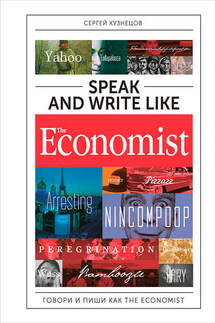Speak and Write like The Economist: Говори и пиши как The Eсonomist - страница 3
The Amish in America spurn modern medicine, along with almost everything else invented since the 17th century.
The UN reckons that by 2100 the planet's population will be rising past 10.9 billion, and be much older. The median age will go up from 29 to 41, and around 28 % will be over 60. A few may even remember this article.
ERC, a research firm, says consumption per person was 999 cigarettes a year in 1990 and only 882 in 2012. Yet the appetite for cigarettes continues to rise. Smokers lit up 5.9 trillion times last year compared with 5.1 trillion in 1990. ERC tracks 123 countries, home to about 99 % of smokers. It finds the worst addicts in central and eastern Europe. Serbians each smoke a lung-blackening 3,323 cigarettes per year, more than any other nationality. Eight of the top ten countries, ranked by consumption per person, are in the former Eastern block.
The more sophisticated the patient, the less scalpel-happy the doctors. The best informed patients of all are, of course, other doctors. Sure enough, physicians went under the knife much less often than the average Ticino resident. Lawyers' wives – whom doctors have good reason to fear – had the fewest hysterectomies of all.
Walgreens is another operator of worksite clinics. One of its 358 centres is in Orlando, at the Disney theme park. It aims to treat Disney's "cast members" quickly (unblocking their huge ears and fixing their fairy wings, presumably), so they can go back to work.
Doctors manage to restart only about half of the hearts that stop in a hospital, and only about a sixth of patients will go on to survive long enough to be discharged. One of the toughest decisions faced by hospital staff is how long to keep trying, and when to give up on a particular patient as a lost cause.
The lexicon of oncology is filled with military metaphors: the war on cancer, aggressive tumours, magic bullets. And although these are indeed only metaphors, they do reflect an underlying attitude – that it is the clinician's job to attack and destroy his patient's tumour directly, with whatever weapons are to hand. As in real warfare, those weapons may be conventional (surgery), chemical (cancer-killing drugs) or nuclear (radiation therapy). There is even talk of biological agents, in the form of viruses specifically tailored to seek out and eliminate their tumorous targets. Which is all well and good as strategies go. But as Sun Tzu observed, the wisest general is not one who wins one hundred victories in one hundred battles, but rather one who overcomes the armies of his enemies without having to fight them himself. And one way to do that is to get someone else to do your fighting for you.
Is dumping faeces in rivers UN policy?
What is depression? The ancient Greeks believed it resulted from an imbalance in the body's four humours: blood, phlegm, yellow bile and black bile (from the Greek word melas or "dark" and kholé, meaning "bile"), with too much of the latter resulting in a melancholic state of mind. Early Christianity blamed the devil and God's anger for man's suffering, with depression the result of the struggle against worldly temptations and sins of the flesh. In the Renaissance it was viewed as a disease of scholars, such as Robert Burton, author of "The Anatomy of Melancholy", who were given to abstract and intense speculation.


